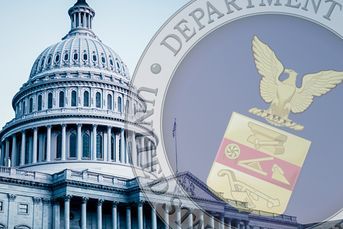DOL Fiduciary Rule: Acosta makes it clear that revisions are coming
Though his decision not to delay the June 9 applicability date of the rule might seem like a blow to opponents, Mr. Acosta made it evident that revising the measure is the endgame.
We were pleased to read Labor Secretary Alexander Acosta’s emphasis on sticking to the rule of law when it comes to deregulation in his Wall Street Journal op-ed last Monday. Though his decision not to further delay the June 9 initial implementation date of his agency’s fiduciary rule might have seemed like a blow to opponents of the regulation, Mr. Acosta made it evident that revising the measure was the endgame.
The administration clearly saw that time was up for another delay. And advisers will benefit at the very least from certainty about the timing of DOL rule elements they will be responsible for meeting in a mere two weeks. Advisers also received answers to frequently asked questions and clarification on enforcement over the period from June 9 through the full implementation date of Jan. 1, 2018.
Now that that’s settled, review of the rule directed by President Donald J. Trump continues, and the winds of change regarding the standard to which advisers will ultimately be held to in dealing with retirement account clients are likely to shift once again. Though Mr. Acosta attempted to keep his op-ed at a higher level, deep skepticism about the fiduciary rule as it stands today was apparent.
The new secretary is still getting up to speed on the regulation, but he has already determined, as stated in the op-ed, that the “controversial” fiduciary rule “may not align with President Trump’s deregulatory goals.” There is little question the aim is for the fiduciary rule to look very different on Jan. 1 than it does today. Mr. Acosta committed to adhering to the Administrative Procedure Act, giving the public notice of changes and a chance to comment: “Agency heads have a legal duty to consider all the views.” But he noticeably only mentioned critics’ arguments in his op-ed. While many industry concerns, such as the potential for increased litigation, deserve consideration, the secretary’s failure to acknowledge proponents’ arguments, including the need to reduce conflicts of interest that erode retirement savings, offered a preview of how revision of the rule might unfold.
There are many opportunities to make this rule better, and where modifications can be made to ease unnecessary regulatory burdens on advisers and firms without losing the core protections it creates for investors, improvements are welcome. But at the root of it, Mr. Acosta will have to decide whether the best course forward for the country is to substantially alter a rule that, as of June 9, holds advisers to impartial conduct standards, which obligate them to serve clients’ best interests, charge reasonable compensation and avoid misleading statements.
Saying Americans “can be trusted to decide for themselves what is best for them,” as he does in his op-ed, assumes they have all the information needed to make a good choice.
(Watch: What’s to come after the June 9 DOL fiduciary rule implementation begins)
But as we learned in our economics courses, there is the circumstance of information asymmetry, in which one party — usually the “seller” — has greater knowledge in a transaction. This is OK when what is being sold is a toaster: The extra expense an unaware buyer may spend on an inferior product won’t break the bank. But when it comes to the much more complicated and consequential area of retirement advice, imperfect information leaves an investor particularly dependent on the good graces of a financial adviser.
Leaving the bad apples out of the equation entirely, the vast majority of financial advisers consistently rise to this responsibility, while others — again, even those wishing their clients well — feel unrelenting pressures from home and firm to get what they can out of a client while still acting suitably.
Mr. Acosta seems to appreciate this, writing in his op-ed, amid talk of lawsuits and limits to choice: “Certainly, it is important to ensure that savers and retirees receive prudent investment advice.”
But the status quo is not accomplishing this to an acceptable degree, and therefore retirement-saver protections should not be ruled out solely to satisfy a broader effort to roll back regulation.
Learn more about reprints and licensing for this article.








